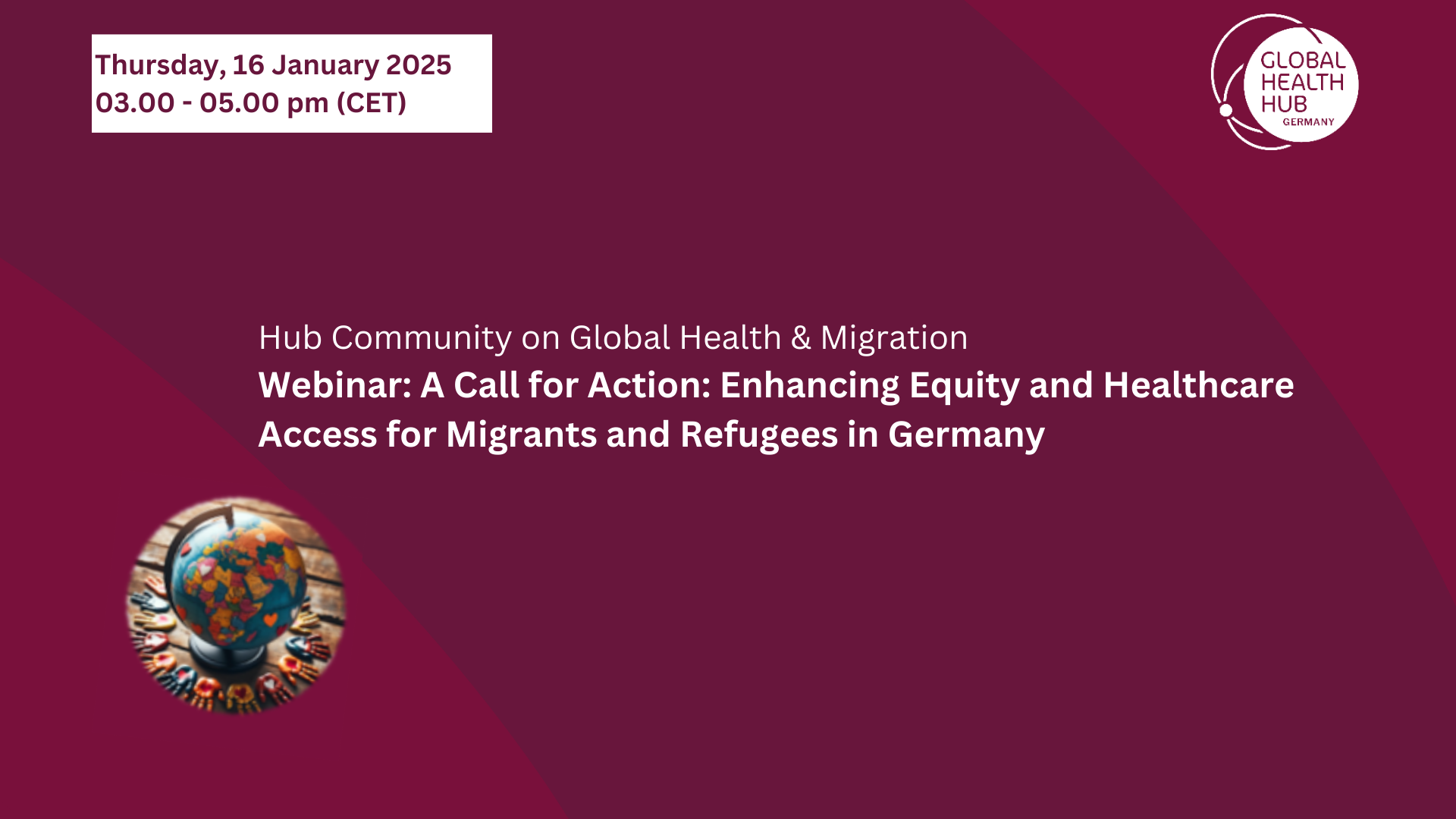Addressing Migrant Health and Workforce Challenges: Insights from Global Health Hub Germany’s Webinar and Policy Brief

On January 17, 2025, the Global Health Hub Germany’s (GHHG) Hub Community on Global Health and Migration organized a webinar called “A Call for Action: Enhancing Equity and Healthcare Access for Migrants and Refugees in Germany.” Here the community managers present the key takeaways of the webinar.
Addressing Migrant Health and Workforce Challenges
Insights from Global Health Hub Germany’s Webinar and Policy Brief
On January 17, 2025, the Global Health Hub Germany’s (GHHG) Hub Community on Global Health and Migration organized a webinar called “A Call for Action: Enhancing Equity and Healthcare Access for Migrants and Refugees in Germany.” The event, building on the policy brief “Prioritising Migrants and Refugees in the Global Health Discourse,” brought together experts, practitioners, and advocates to explore solutions to healthcare challenges faced by migrants and refugees while also tackling workforce shortages in the German healthcare system.
The webinar was inaugurated by Corinna Heineke, Managing Director of the GHHG in Berlin, Germany, who delivered an opening speech emphasizing the importance of collaboration and inclusivity in addressing migrant health challenges.
Dr. med. Sonu Bhaskar, MD, PhD, Fellow of the American Neurological Association (FANA), the lead author of the policy brief and a founding member and co-manager of GHHG’s Global Health and Migration Hub Community, provided an overview of the community’s progress since its establishment in 2022. Dr. Bhaskar shared key takeaways from the policy brief, and underscored the importance of integrating migrants and refugees into global and national health agendas.
The keynote address was delivered by Dr. med. Michael Knipper, MD, from the University of Giessen, focusing on "Barriers and Opportunities in Access to Healthcare for Migrants and Refugees." Dr. Knipper highlighted the structural challenges migrants face in accessing healthcare and provided ethical and policy-driven solutions to address these issues.
This was followed by a presentation by Indre Karciauskaite (National Research Institute for Agriculture, Food and Environment (INRAE), Paris, France), which explored strategies for incorporating migration into health policy frameworks and shared insights from advocacy experiences. Additionally, Dr. med. Joost Butenop, MD, MPH (German Public Health, Bavarian Government), delivered a talk titled "Implementation of Legal Frameworks and Policies," examining the role of legal structures in improving healthcare access and integration for migrants.
The event concluded with a panel discussion moderated by Dr. rer. medic Henna Riemenschneider, MA, MPH, PhD (Co-Manager of GHHG’s Global Health and Migration Hub Community), and Dr. Sonu Bhaskar. The panel included all speakers, in addition to Dr. med. Martina Steinmaurer, MD, Dr. Maureen McGowan, MSc, PhD, Dr. Sonia Diaz-Monsalve, PhD, Dr. Zahra Kariminian, PhD, and Dr. Veronica Dodero, PhD. Panellists discussed practical solutions for addressing migrant health challenges, shared diverse perspectives, and emphasized the need for a collaborative approach to health system reforms.
Dr. Riemenschneider delivered the closing remarks, highlighting the importance of integrating training on migrant health into the education and professional development of healthcare workers.
Key Insights from the Policy Brief
The Global Health and Migration policy brief published in 2024 provided a comprehensive framework for addressing the unique health challenges faced by migrants and refugees while leveraging their contributions to strengthen healthcare systems. Key recommendations include:
- Migrants and refugees must be recognized as stakeholders in global health and One Health discussions. Their unique health challenges and contributions to host societies should be prioritized.
- Migrants face barriers such as language, cultural differences, and limited access to services. Recommendations include multilingual health education campaigns, cultural competency training for healthcare providers, and mobile health programs.
- Germany’s aging population and workforce shortages present an opportunity to integrate skilled migrants into the healthcare system. Ethical recruitment practices, aligned with the WHO Global Code of Practice, are essential to ensure mutual benefits for both host and source countries.
- A multidisciplinary approach is critical to addressing the social determinants of health for migrants. Collaboration across healthcare, education, and employment sectors can foster better integration and long-term resilience.
- Climate-driven migration adds complexity to health challenges. Proactive solutions, such as anonymous healthcare services and disaster preparedness, are critical to addressing the needs of displaced populations and mitigating strain on host systems.
- Legal frameworks must support equitable healthcare access and the integration of migrants into host communities. Investments in healthcare infrastructure, language training, and vocational education are also critical.
The GHHG’s Global Health and Migration Hub Community remains committed to advancing this agenda through research, advocacy, and stakeholder engagement. As Germany navigates the complex challenges of migration and workforce demands, the GHHG’s work continues to serve as a valuable resource for policymakers, practitioners and advocates striving to create a more inclusive and sustainable healthcare system.
Note: The whole Policy Brief can be accessed via the our website or through the DOI. A link to the recording of the webinar will follow soon.